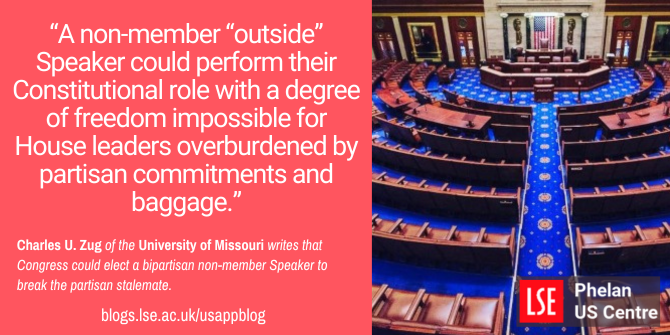 This week the US House of Representatives voted to vacate the office of the House Speaker, ousting the incumbent, Republican Kevin McCarthy. Charles U. Zug writes that the Republican Party’s current thin House majority hands an outsized amount of power to the party’s right-wing legislators, making the selection of a new Speaker with bipartisan support very unlikely. Instead, he argues, the House should consider electing a non-member as Speaker, who could push past partisan differences and help deflate the mutual hostility present on both sides of the aisle.
This week the US House of Representatives voted to vacate the office of the House Speaker, ousting the incumbent, Republican Kevin McCarthy. Charles U. Zug writes that the Republican Party’s current thin House majority hands an outsized amount of power to the party’s right-wing legislators, making the selection of a new Speaker with bipartisan support very unlikely. Instead, he argues, the House should consider electing a non-member as Speaker, who could push past partisan differences and help deflate the mutual hostility present on both sides of the aisle.
Rep. Kevin McCarthy’s (R-CA) recent removal from the House Speakership is only the beginning of the House of Representatives’ organizational troubles. Whoever can cobble together enough support to become the next GOP Speaker will face similar challenges from the Republican Party’s obstructionist right wing, which is likely to hinge their support on the preservation of the single member “motion to vacate” rule that unceremoniously ended McCarthy’s Speakership. Until at least the 2024 election, the House will continue to operate under the constant threat of losing its chief officer and having to stop all business to select another.
Like it or not, the Republican Party’s problems are therefore the whole House’s problems, and it is hard to imagine a solution within the current partisan paradigm. And yet, because it allows for the possibility of a non-member Speaker—that is, a Speaker who is not currently an elected member of the House of Representatives—the Constitution provides a path toward a relatively more functional Congress. In principle, an outside Speaker with few partisan commitments and a minimal level of goodwill with both parties in Congress could manage a coalition more effectively than could a party leader from either Congressional caucus.
Partisan Gridlock
The Speaker is the only Constitutionally established leadership position in the House of Representatives. And while the power of the office has waxed and waned since the founding, Speakers have always played a pivotal role in the legislative process. As if to emphasize this role, House rules require the selection of a Speaker before any other House business, such as the all-important selection of committee members, can commence.

Credit: United States House of Representatives or Office of the Speaker of the House [Public domain]
These rules pose a problem for the current House—or more specifically, for the Republican Party caucus within the House—which, because of its slim majority, makes both selecting and retaining a Speaker exceedingly precarious. A small but determined faction of Republicans led by Rep. Matt Gaetz (R-FL) have used their party’s small majority to disrupt even basic procedural votes in the chamber.
Because the House typically selects its Speaker by party-line vote, the majority party is incentivized to converge on a leader despite inter-party differences. Historically, parties have been able to do this even in the event of slender majorities because of the considerable benefits that flow to individual members from being in the Speaker’s party. By the same token, at least in normal times it is against a member’s interest to have opposed whoever goes on to assume the post; consider how previous Speakers (most recently Nancy Pelosi in 2019) punished members who opposed their bids and rewarded those who supported them.
But we are no longer in normal times. After the midterms in late 2022, the electoral stars aligned to put the presumptive next Speaker, Kevin McCarthy, in an almost impossible bargaining position vis-a-vis his own party caucus. Working with a razor-thin majority, McCarthy during January 2023 was dealt a series of humiliating election defeats by a small but mobilized faction of his own Congressional party. To gain their consent, McCarthy had to agree in advance to weaken his hold on the office he had so desperately sought to obtain. The extent of his weakness was revealed a mere nine months later, on October 3, when McCarthy was easily forced from the chair and the House began the process of selecting a new Speaker. His reign was the second shortest in Speaker history.
The House and the Constitutional Order
One of the most curious provisions of the Constitution is that the Speaker of the House is not formally required to be a sitting member of that chamber. According to chapter 34 of House Practice, the official compilation of the parliamentary norms of the chamber, “The Constitution does not limit [the Speaker’s] selection from among…the sitting membership of the House.” The relevant passage of Article 1, section 2 of the Constitution reads, “The House of Representatives shall chuse their Speaker and other Officers”—“other Officer” referring to non-member positions such as the Sergeant at Arms. In contrast, the parallel passage in Article 1 discussing the Senate states, “The Senate shall chuse their other Officers, and also a President pro tempore, in the Absence of the Vice President.” This phrasing implies that whereas the House Speaker is grouped with “other Officers” as positions that are open to non-members (e.g., the Sergeant at Arms), the Senate President pro tempore is not an “other Officer” and belongs in a category reserved for sitting Senators.
Historically, of course, Speakers have always been members of the House. Yet as a matter of practice, the option of a non-member Speaker has remained open, as shown by the fact that members often vote for non-members during Speaker elections and the House counts their votes as valid.
By allowing for a non-member Speaker, the Constitution furnishes tools for working through a situation much like the one the House is currently in, one in which no single House member has the political capital to perform their Constitutional function: secure the confidence of enough of the chamber to govern. In theory, a non-member “outside” Speaker could perform their Constitutional role with a degree of freedom impossible for House leaders overburdened by partisan commitments and baggage.
This resource is important as a potential means for resolving Congressional stalemate, to be sure. But it also has more than merely pragmatic or utilitarian value. The non-member provision can function as a way of enabling the Constitution to fulfill its core purpose: realizing the national common good through deliberative institutional majorities.
The non-member provision accounts for a situation in which the normal operations of the House have broken down, perhaps as a consequence of irresponsible partisanship or what the Constitution’s framers would have called “factionalism.” In some ways, factionalism is incentivized by the structure of the House itself. While certain design features are intended to disrupt factions—e.g., large electoral districts and fixed terms of office—others can have the effect of encouraging it. House terms are relatively short, for example, which forces members to be more responsive to public opinion, for good or for ill. Unlike in the Senate, House terms are not staggered, which can result in impetuousness and groupthink. Most importantly, the need to select a Speaker is itself a provocation toward factiousness; competing groups within the chamber wish to see their faction’s leader empowered, and vying leaders in turn have an incentive to consolidate support for themselves at the expense of others. (It is telling that the Senate, which is structured to offer its members more autonomy and to cultivate a more deliberative ethos, has no equivalent to the House Speaker.) The volatile House therefore needs a strong leader capable of imposing order, yet under certain circumstances, the need to select a leader is itself an invitation to further volatility. Hence the present crisis.
The House is also designed to be closer to the voting public, which in theory gives it a kind of egalitarian legitimacy that the other offices of the Constitution participate in, to a lesser degree. At the same time, those very design features make it more subject to the kinds of turmoil it is currently experiencing, especially in an environment of insecure majorities and hyperpartisan obstruction. Witness, among other examples, the willingness of GOP Senators to support Ukraine aid notwithstanding pressure from their party to oppose it. In contrast, House Republicans are almost universally opposed to such aid.
It is in precisely this kind of situation that a non-member Speaker makes the most sense. Such a figure could pragmatically identify areas of overlapping interest without being hamstrung by hyperpartisan distrust. Such a Speaker would also operate under less suspicion of using their power to benefit one party over the other because they would have minimal preexisting commitments to either party. The selection of a nonmember speaker, in other words, could be the first step out of the morass in which Congress is now mired and towards the kind of governance the Constitution was established to facilitate.
How might a coalition Speaker work in practice?
The impediments to a coalition Speakership—that is, the selection of a Speaker with bipartisan support—are rooted less in competing interests than in partisan distrust and optics: neither party wants to be seen as abetting the other party’s Speaker. Given the current partisan ecosystem, any plausible contender for Speaker among the current House leadership— Steve Scalise (R-CA) or Jim Jordan (R-OH) on the one side, Hakeem Jeffries (D-NY) or Pramila Jayapal (D-WA) on the other—would be perceived as having too much partisan baggage to attract the bipartisan support that is institutionally needed. Among sitting members of Congress, that would leave only the backbenchers, who as such lack the networks, reputation, and political leverage to command the support of their party caucuses, let alone a bipartisan majority. And as the Republican experience confirms, many backbenchers are more polarized than their party leaders.
A non-member Speaker, by contrast, could intervene in ways that would enable both party leaders and the rank and file to identify areas of shared interest previously obscured by partisan mistrust. They could also serve as a lightning rod, making controversial decisions that would draw criticism away from both parties thereby deflating mutual hostility. In some ways, a non-member Speaker would function like the arbitrator in the model of triadic dispute resolution. By relieving both parties of the self-defeating urge to tarnish and humiliate the other, the arbitrator creates space for members to concentrate on their legislative interests, which happen in some cases to be interests shared by both parties.
But perhaps the greatest benefit of a non-member Speaker would be to marginalize the obstructionist faction of the GOP, whose members and whose leader are deeply unpopular with Democrats and normal Republicans alike.
To be sure, even within this highly speculative example there is no guarantee a non-member Speaker would succeed in the job. Reasons for why Speakers have historically been chosen from the ranks of the House abound, including institutional experience and knowledge. There is no telling how a non-member Speaker would navigate their role because they would essentially be creating that role out of whole cloth. Yet there are practical reasons to be open to such a possibility, not least of which is that the current arrangement has resulted in near-complete institutional failure. An outside Speaker would have to clear a low threshold of success to be an improvement on our current situation, and to make the House live up to its basic Constitutional responsibilities.
- Please read our comments policy before commenting.
- Note: This article gives the views of the author, and not the position of USAPP – American Politics and Policy, nor the London School of Economics.
- Shortened URL for this post: https://bit.ly/3Q3v4PI







Demands of reason and patriotism should open House members and the nation at large to Professor Zug’s proposal. I have an easier time seeing the likes of Jeffries than the likes of Jordan considering it. But I can see sufficient bipartisan support to elect someone like John Kasich to the speakership. The idea of House members electing a non-member to be third in line for the presidency roughly parallels the framer’s original hopes for the presidential electoral college. The nation may lack the moral and intellectual wherewithal both within and outside the House to make the idea work. But one would think the nation’s present situation would compel us to give the proposal serious thought.